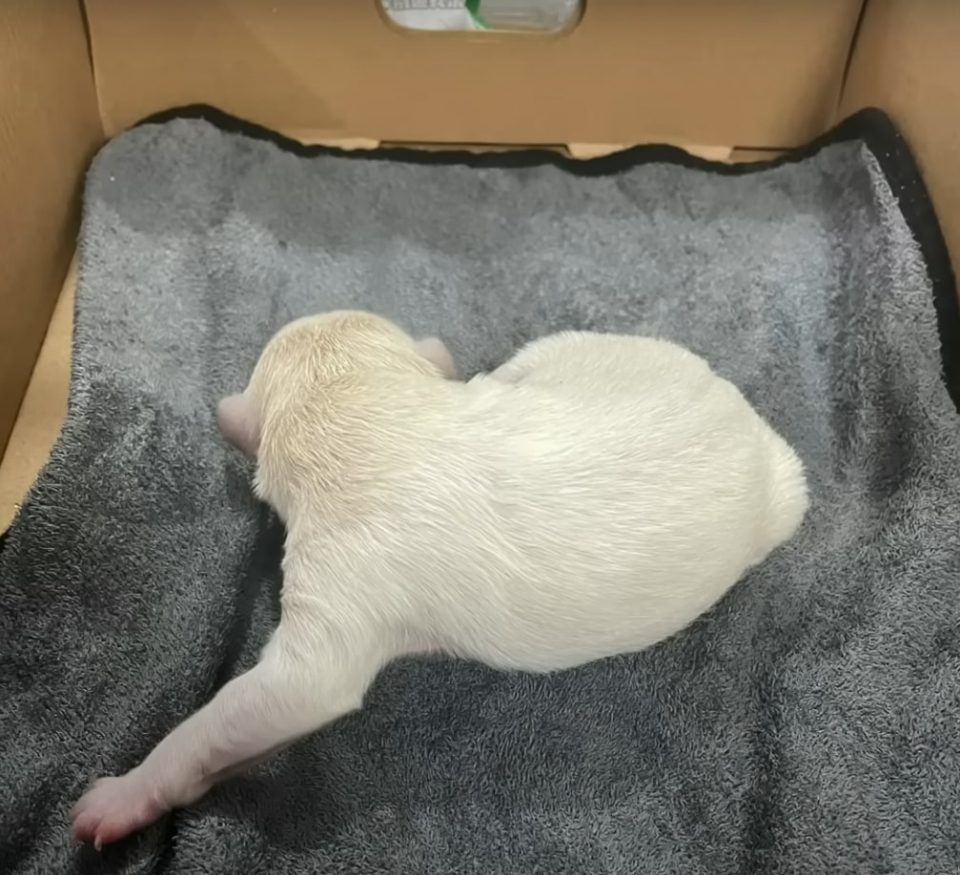Imagine the level of despair and fear a helpless, lost child must feel in the world without his momma. Well, that’s what life is for many abandoned puppies out there.
All alone and abandoned by absolutely everyone, these teeny-tiny four-legged creatures live every day on the edge. And, sadly, only a few lucky ones ever succeed in finding a way out.
The rest wait for the inevitable to happen, completely cut off from basic humane supplies, such as food and a nice, cozy place to be.
One such story recently broke thousands of hearts all over the world. A puppy, only a couple of days old, was found on the street, and he was given zero chance to survive.
Lying On The Side Of The Road All Alone

The kind-hearted rescuers who heard crying in the heavy rain immediately sprung into action. When they got out on the street, they were left shocked to the bone!
A tiny puppy was lying in the rain, with no momma or any of his littermates near. He was completely left at the mercy of the streets.
After the initial shock, the kind people quickly grabbed the puppy from the ground and took him to their home. There, his new life chapter slowly started to unfold!

Aware of his age and the condition he was found in, the rescuers immediately placed the pup into a warm, cosy bed with a blankie. They wanted to make sure he felt safe, and they were right!
The pup soon calmed down and was ready for a nice meal from the bottle.

After a long, exhausting day on the street, he fell asleep carefree for the first time since abandonment.
In a home filled with love and compassion, the pup felt safe. Even though he still had a long way to go, the rescuers knew that somehow, it was all gonna end well.
But, things weren’t as good as they expected.
The Road To Recovery

During his first week of age, the puppy coped with a lower stomach injury and a fever. The rescuers decided to take him to a local vet clinic, where he was carefully checked up.
Then came a shock!
The doctor said that the pup just had a common fever, but the real problem was one of his legs. According to the vet, one of his leg joints showed signs of abnormal development, which required timely treatment.
Although he wasn’t required to stay at the hospital, the pup needed to be given medications every three days. And, the healing journey began!
An Incredible Transformation

In only two months, the pup showed signs of unbelievable progress. He grew and transformed into a happy, playful dog who was just happy to embrace the world around him.
Then, on the 68th day, the wonderful news arrived!
After a long treatment, this sweet boi no longer needed treatment, as his leg was fine! His joints returned to normal, and he embarked on a new life journey as a completely healthy boi!

Now, he has a whole new life ahead of him, and a family who loves him the most. He plays, goes on walks, takes trips, and enjoys every little thing surrounded by the people who won’t let him go, ever.
Once an abandoned pup fighting for his life on the street, this boi is now where he was always supposed to be – in a loving, forever home!
If your furry friend seems to be on a non-stop scratching spree, you’re not alone in facing this common canine conundrum. Picture this: you’re chilling with your pup, and suddenly, they start scratching like there’s no tomorrow. It can be quite puzzling, right? Well, fret not, as we’re here to shed some light on this itchy situation.
You may find yourself pondering why your dog is scratching excessively, causing both of you some discomfort. From environmental factors to pesky parasites, various reasons could be triggering this incessant scratching behavior. Understanding the root cause is the key to restoring your pup’s peace and curbing the urge to scratch.
Understanding the Itch: What Makes Dogs Scratch?
Common Causes of Itching in Dogs
If your dog is scratching excessively, various factors could be causing this behavior. One common cause is allergies, which may result from food, environmental triggers like pollen or dust, or contact with irritating substances like certain shampoos. Infections, both fungal and bacterial, can also lead to itchiness. Additionally, external parasites such as fleas, ticks, or mites could be the culprits behind your dog’s scratching.
Identifying the Signs of Excessive Scratching
To determine if your dog’s scratching is excessive, look for signs such as red or irritated skin, hair loss in the affected areas, constant licking or biting at the same spot, and scabs or hot spots on the skin. Excessive scratching can lead to discomfort and even skin infections if left untreated, so it’s essential to monitor your dog’s scratching habits closely. If you notice persistent scratching or any of these symptoms, consulting a veterinarian is recommended to diagnose the underlying cause and provide appropriate treatment.
Allergies and Your Canine Companion
Types of Allergies Affecting Dogs
Allergies in dogs are more common than you might think. They can be triggered by various factors, such as food, environmental elements like pollen or grass, or irritants present in shampoos or household products. Your furry friend might be allergic to certain things in their surroundings, leading to excessive scratching and discomfort.
Managing Allergies in Dogs
When it comes to managing your dog’s allergies, the key is to identify the specific trigger. This can involve conducting tests with your vet to pinpoint the exact allergen causing the reaction. Once you know what’s causing the problem, you can take steps to minimize your dog’s exposure to it. This might involve changing their diet, using hypoallergenic grooming products, or making adjustments to their environment to create a more allergy-friendly space. Remember, every dog is different, so what works for one may not work for another. If you suspect your dog has allergies, consulting with a veterinarian is crucial for proper diagnosis and treatment.
Parasites and Pests: The Itchy Invaders
Fleas, Ticks, and Mites
These tiny pests can cause big problems for your furry friend. Fleas are common culprits, causing intense itching and discomfort. Ticks can transmit diseases and lead to skin irritation. Mites are microscopic but mighty, triggering allergic reactions in some dogs. Regularly check your dog for these pests, especially after outdoor adventures.
Parasite Prevention and Treatment
Prevention is key when it comes to parasites. Use vet-recommended flea and tick preventatives to keep these critters at bay. Regular grooming helps spot any unwelcome guests early. If your dog does get infested, prompt treatment is essential. Consult your vet for the most effective parasite treatment options tailored to your dog’s specific needs.
Skin Conditions and Dermatological Issues
Canine Atopic Dermatitis
If your dog is scratching excessively, one common skin condition to consider is Canine Atopic Dermatitis. This is a chronic allergic skin disease that often manifests as itching, leading to scratching, licking, and chewing. The itching is usually focused on the face, feet, ears, armpits, and belly. Canine Atopic Dermatitis could be triggered by environmental allergens like pollen, dust mites, or mold. If you notice your furry friend showing signs of constant scratching and skin irritation, a visit to the vet could help diagnose and manage this condition effectively.
Other Common Skin Conditions in Dogs
Apart from Canine Atopic Dermatitis, several other skin conditions may cause your dog to scratch excessively. These include bacterial or fungal infections, hot spots, and secondary skin infections caused by parasites like fleas and ticks. Bacterial or fungal infections can result in red, inflamed skin with a foul odor. Hot spots are moist, red sores that develop quickly and can be quite painful for your pet. Additionally, parasites like fleas and ticks can lead to intense itching and skin irritation.
Remember, identifying the specific skin condition causing your dog’s excessive scratching is crucial for effective treatment. If you notice any signs of skin issues, consulting your vet promptly is the best course of action to ensure your dog’s skin health and overall well-being.
Nutritional Influences on Skin Health
The Role of Diet in Skin Conditions
When it comes to your furry friend’s skin health, the diet plays a crucial role. A balanced and nutritious diet can help maintain healthy skin and reduce the likelihood of skin issues that may lead to excessive scratching. Ensure that your dog’s food is rich in essential nutrients like Omega-3 fatty acids, vitamins, and minerals, which are essential for skin health. By providing a high-quality diet tailored to your dog’s specific needs, you can support their skin’s overall health and reduce the risk of allergic reactions that might cause itching.
Supplements for Improving Skin and Coat Health
In addition to a nutritious diet, supplements can also play a significant role in improving your dog’s skin and coat health. Supplements like fish oil, which is rich in Omega-3 fatty acids, can help reduce inflammation and itching, promoting a healthier skin barrier. Other supplements such as biotin and zinc can also support skin health and contribute to a shiny coat. Consulting with your veterinarian to determine the right supplements for your dog based on their individual needs can help address any deficiencies and enhance their skin and coat condition.
Behavioral Factors Behind Scratching
Stress-Related Scratching
Dogs, like humans, can get stressed. When your furry friend feels anxious or uneasy, they may resort to scratching excessively. This behavior can be a response to various stressors in their environment or routine. It’s important to identify the triggers causing stress in your dog to help alleviate their discomfort and reduce the urge to scratch excessively.
When Scratching Becomes a Habit
Sometimes, scratching can turn into a habit for your dog. It might start innocently but develop into a repetitive behavior. This habitual scratching could stem from boredom, anxiety, or even a lack of physical or mental stimulation. Breaking this habit requires patience and understanding along with providing your dog with engaging activities, toys, and attention to redirect their focus away from scratching excessively.
When to Seek Veterinary Help
Recognising Symptoms that Require a Vet’s Attention
If your furry friend is scratching excessively to the point of causing skin irritation, redness, or hair loss, it’s time to consult a vet. Look out for signs like persistent itching, hot spots, scabs, or foul odor emanating from the skin. These symptoms may indicate underlying health issues that need professional assessment.
What to Expect During the Veterinary Evaluation
During the vet visit, expect a thorough examination of your dog’s skin to check for any signs of infections, allergies, or parasites. The vet may conduct tests to identify the root cause of the scratching, which could include skin scrapings, blood tests, or allergy testing. Based on the evaluation, your vet will recommend an appropriate treatment plan to alleviate your dog’s itching and improve their skin health.
Conclusion
So, there you have it! Remember, when your furry friend can’t stop scratching, it could be due to allergies, infections, parasites, or even behavioral issues. It’s crucial to get to the bottom of the problem by consulting with your vet, adjusting their environment, and ensuring they have a balanced diet. Don’t forget about those pesky parasites – regular grooming and vet-recommended products are key. And if your dog’s scratching persists or worsens, don’t hesitate to seek professional help. By being proactive and attentive to your dog’s needs, you can help them find relief from excessive scratching and keep their skin healthy and happy.
Frequently Asked Questions
What are the common reasons behind excessive scratching in dogs?
Dogs may scratch excessively due to allergies, infections, and parasites. Identifying the root cause is crucial for effective management.
How can allergies in dogs be managed?
Allergies in dogs can be managed through vet tests to pinpoint triggers and environmental adjustments to minimize exposure.
How can parasites like fleas and ticks be prevented and treated?
Use vet-recommended products for parasite prevention and grooming to maintain a healthy coat and skin.
What role does nutrition play in maintaining healthy skin for dogs?
A balanced diet rich in Omega-3 fatty acids, vitamins, and minerals is essential for healthy skin in dogs.
Are supplements beneficial for improving skin and coat health in dogs?
Supplements like fish oil, biotin, and zinc can improve skin and coat health, but consulting with a vet for tailored recommendations is crucial.
What are the behavioral factors contributing to scratching in dogs?
Stress-related scratching due to anxiety and scratching habits from boredom are common behavioral factors that require patience and redirection strategies.
When should pet owners seek veterinary help for their dog’s scratching?
Pet owners should seek veterinary help if their dog shows symptoms like persistent itching, hot spots, scabs, or foul odor, as these may indicate underlying health issues.
What should pet owners expect during a veterinary evaluation for a scratching dog?
A veterinary evaluation may include a thorough skin examination and tests to identify the root cause of scratching, leading to a tailored treatment plan.
[no_toc]

Hey there, I’m Janet Brooks, a dog-loving student from California. I’m all about helping pups in need, especially those without homes. Me and my awesome friends work together to give shelter and love to stray dogs. Oh, and I also write blogs about dogs to share helpful info.